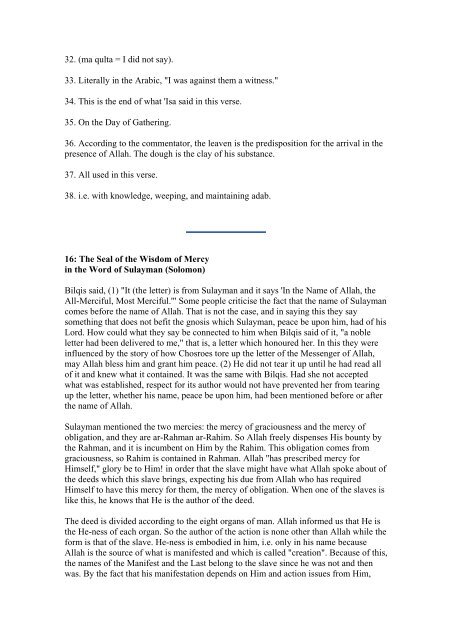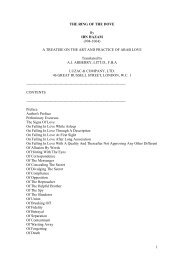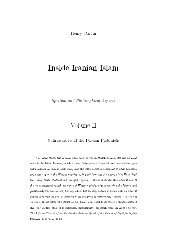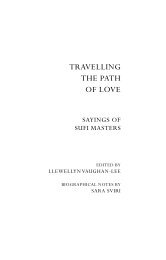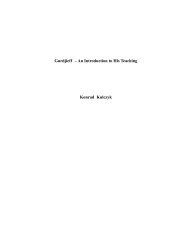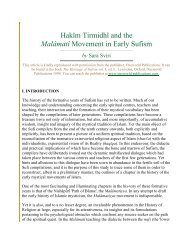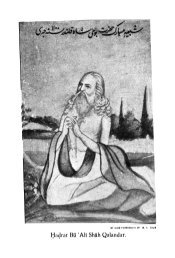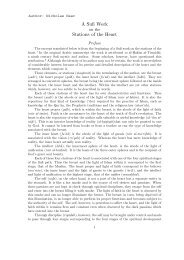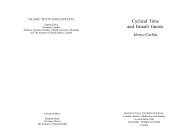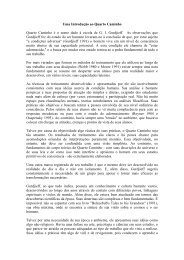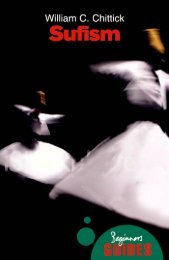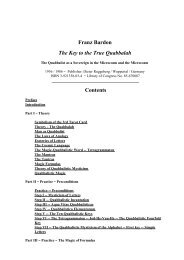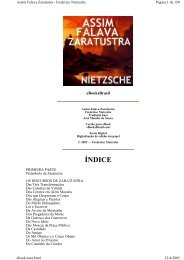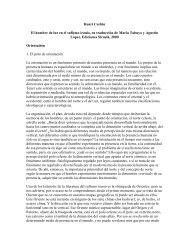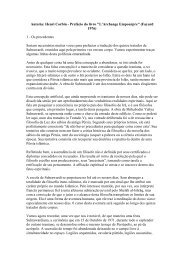Fusus al-Hikam The Seals of Wisdom by Shaykh al ... - ImagoMundi
Fusus al-Hikam The Seals of Wisdom by Shaykh al ... - ImagoMundi
Fusus al-Hikam The Seals of Wisdom by Shaykh al ... - ImagoMundi
Create successful ePaper yourself
Turn your PDF publications into a flip-book with our unique Google optimized e-Paper software.
32. (ma qulta = I did not say).<br />
33. Liter<strong>al</strong>ly in the Arabic, "I was against them a witness."<br />
34. This is the end <strong>of</strong> what 'Isa said in this verse.<br />
35. On the Day <strong>of</strong> Gathering.<br />
36. According to the commentator, the leaven is the predisposition for the arriv<strong>al</strong> in the<br />
presence <strong>of</strong> Allah. <strong>The</strong> dough is the clay <strong>of</strong> his substance.<br />
37. All used in this verse.<br />
38. i.e. with knowledge, weeping, and maintaining adab.<br />
16: <strong>The</strong> Se<strong>al</strong> <strong>of</strong> the <strong>Wisdom</strong> <strong>of</strong> Mercy<br />
in the Word <strong>of</strong> Sulayman (Solomon)<br />
Bilqis said, (1) "It (the letter) is from Sulayman and it says 'In the Name <strong>of</strong> Allah, the<br />
All-Merciful, Most Merciful.'" Some people criticise the fact that the name <strong>of</strong> Sulayman<br />
comes before the name <strong>of</strong> Allah. That is not the case, and in saying this they say<br />
something that does not befit the gnosis which Sulayman, peace be upon him, had <strong>of</strong> his<br />
Lord. How could what they say be connected to him when Bilqis said <strong>of</strong> it, "a noble<br />
letter had been delivered to me," that is, a letter which honoured her. In this they were<br />
influenced <strong>by</strong> the story <strong>of</strong> how Chosroes tore up the letter <strong>of</strong> the Messenger <strong>of</strong> Allah,<br />
may Allah bless him and grant him peace. (2) He did not tear it up until he had read <strong>al</strong>l<br />
<strong>of</strong> it and knew what it contained. It was the same with Bilqis. Had she not accepted<br />
what was established, respect for its author would not have prevented her from tearing<br />
up the letter, whether his name, peace be upon him, had been mentioned before or after<br />
the name <strong>of</strong> Allah.<br />
Sulayman mentioned the two mercies: the mercy <strong>of</strong> graciousness and the mercy <strong>of</strong><br />
obligation, and they are ar-Rahman ar-Rahim. So Allah freely dispenses His bounty <strong>by</strong><br />
the Rahman, and it is incumbent on Him <strong>by</strong> the Rahim. This obligation comes from<br />
graciousness, so Rahim is contained in Rahman. Allah "has prescribed mercy for<br />
Himself," glory be to Him! in order that the slave might have what Allah spoke about <strong>of</strong><br />
the deeds which this slave brings, expecting his due from Allah who has required<br />
Himself to have this mercy for them, the mercy <strong>of</strong> obligation. When one <strong>of</strong> the slaves is<br />
like this, he knows that He is the author <strong>of</strong> the deed.<br />
<strong>The</strong> deed is divided according to the eight organs <strong>of</strong> man. Allah informed us that He is<br />
the He-ness <strong>of</strong> each organ. So the author <strong>of</strong> the action is none other than Allah while the<br />
form is that <strong>of</strong> the slave. He-ness is embodied in him, i.e. only in his name because<br />
Allah is the source <strong>of</strong> what is manifested and which is c<strong>al</strong>led "creation". Because <strong>of</strong> this,<br />
the names <strong>of</strong> the Manifest and the Last belong to the slave since he was not and then<br />
was. By the fact that his manifestation depends on Him and action issues from Him,


